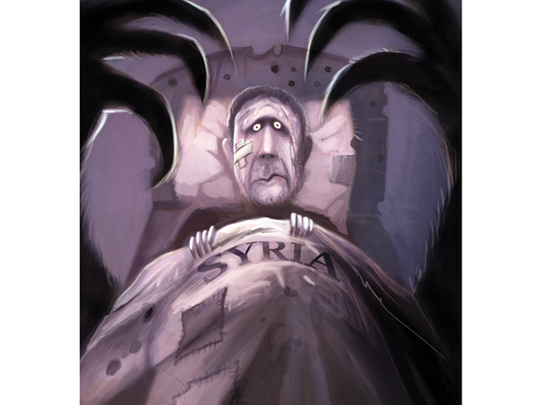
On the face of it, everyone wants a political solution to the Syrian civil war started four years ago in March 2011. International diplomats and politicians have been tirelessly singing the tune of a “political solution” and getting the warring parties, including the Assad regime to the negotiating table but to no avail. What is heart-aching is the death, destruction and carnage of such a war, dubbed as the worst human disaster since World War II. Figures are constantly going up with an estimated 170,000 killed so far, and over 3 million made into refugees, scurrying to neighboring countries like Lebanon, Jordan and Turkey, and with mostly having nothing on their backs. Further, and the number is still raising, there are more than 6.5 million displaced persons because of the government/factional fighting inside the country which has been turned into militia enclaves each guarding its own plot of territory with civilians at the butt end of rifles, flying bullets, and “barrel-bombs” dropped from mid-air. Two extraordinary elements fueled the Syrian civil war probably more so than any other and that is internationalization of the conflict with states like Iran, Russia, Turkey, Qatar, Saudi Arabia as well as actors like Hizbollah and individual Jihadists coming into the country to take pot-shots at one another in a deadly cauldron. The regime has maintained its powerful strength through strong unity among the Baath, police, army and security apparatuses. In the beginning of the conflict the regime appeared to have lost ground as with Arab Spring countries like Tunisia, Libya and Egypt. However, today, it’s firmly in control, resembling the apparatchik of Eastern Germany before the downfall of the Berlin Wall. The regime has done one better, clinging to power at the scruff of the neck but also helped by the dispute-rife fractious armed opposition led by such entities as the Free Syrian Army and the multitudes of Islamic militias like Isis and Al Qaeda. But aside from this quagmire, Syria can still be saved from the slippery-slope of the unknown. There has to be a political solution, short of a zero-sum game where winner takes all. Even the most vociferous supporters of the Syrian regime like Iran, Russia and to a lesser extent, China have argued at the end of the day, a political solution must be reached to end all hostilities. International diplomats, including the United Nations hold the view of the idea of dialogue would be the best method to bring the warring sides together. Its holding of the Geneva talks early in 2014 and last year of bringing opposition and the regime together with last month’s appointment of Swedish-Italian Staffan de Mistura as UN envoy, must surely make a difference. The tenacity of the UN Secretary-General Ban Ki-moon must be praised here for this is the third appointment since Lakhdar Brahimi resigned on May 21 because of “diplomatic fatigue” after a two-year stint of shuffling between New York, Cairo’s Arab League and Damascus. He had been also proceeded by Kofi Annan who faced the same fate of failure. These diplomatic initiatives were made with western powers like the US — although not publicly — came to believe the Syrian regime is here to stay and there is no getting around to dealing with the present government regardless of how tasteless that maybe. This view has been reinforced by the 3 June Syrian presidential election when Bashar Al Assad got a landslide majority for another 7-year term in office which effectively ended speculation that the regime may still call it a day and quit. Seeing there is no way out, diplomats, out of fear initiative loss, began calling for a “constructive engagement” even if these are uttered from behind closed doors and with the regime as part of a bigger plan to strengthen the springboards of society starting with appealing to outside powers like Russia not to arm or support the regime as first put by Kofi Annan. He argued, but unfortunately with no one willing to hear, that Moscow must be at the negotiating table and its leadership forced to a negotiated settlement; and with specific calls on other regional powers like Turkey and Gulf countries to stop supporting and arming the warring factions. While this is indeed good deeds, more and more voices are being heard internationally, amongst them in Europe that diplomacy should work from the bottom upwards and downwards with encouraging the build up of group-to-group ceasefires and stop regime and inter-factional fighting and dismantle what is being seen as the war economy of fear, kidnapping and arm-sales to the highest bidder. Since politics is the art of the possible and impossible, having a go at stopping a war-ravaged society may not altogether be a shot in the dark. The idea here being to build up of support groups, rehabilitate civil society institutions and creating new leaderships from the grass-roots upwards on different local levels. These will not necessarily work outside and/or against the regime but within it. A working model of that could be the one adopted in Yemen just before Ali Abdullah Saleh abdicated from power in November 2011, in favor of his deputy Abd Rabboh Mansour Hadi. The civil war must surely end. It is a historical inevitability. However when and at what cost is anybody’s guess. The civil war in Lebanon lasted for 15 years, from 1975 till 1990, surely Syria shouldn’t have to wait that long for people to re-establish normal lives where the transient refugees are repatriated back to their home country. Marwan Asmar is a commentator based in Amman. He has long worked in journalism and has a Phd in Political Science from Leeds University in the UK.












